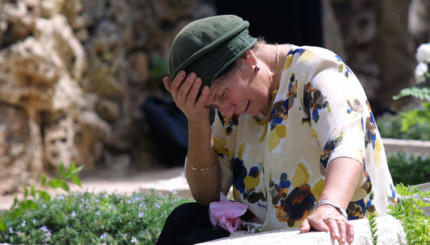Last year I wrote a lot about my experiences mourning for my mother. It was an intense and exhausting year, and it still feels very raw to me, though her yahrzeit was in August. Last night I was babysitting a baby who threw up, and then was given the baby equivalent of Ensure. When my mom was sick she was constantly vomiting and then I would give her an Ensure or a Boost to make sure she didn’t lose all of the calories. The child I was caring for was fine, but I the whole scene was a real trigger for me of all of the painful times immediately before and after her death.
I knew all along that grieving was a long term thing, but I don’t think I realized how it creeps up on you the way it did last night, leaving me in tears as I tried to clean up a baby and a high chair.
I’ve also been thinking a lot about grief because I read a wonderful interview in the Philadelphia Jewish Voice about a family coping with the loss of their teenage daughter. The interview talks about a lot of the tough choices we make in the immediate aftermath of a loss, and also the helpful and hurtful things people say and do.
Rabbi Milgram: First, let’s talk about what kind of support those experiencing such a trauma need, then how you resolved the Jewish ritual and ethical issues.
Amy: The hardest thing for me was, and is, people giving advice, often unwanted, about how and how long we should grieve and what is considered normal. The victim’s unit of the state police was ineffective; the only resource they left us with was information about a self help group that meets once a month. Friends and family were very helpful in driving us where we needed to go and easing our burdens, but we also needed someone who could understand what we were going through. The woman assigned to us from the victim’s unit was young and didn’t have children. How could she possibly even begin to understand how parents feel when they learn they must outlive their child? This isn’t something we can get over or recover from; our anguish is a reflection of our love.
Jewish tradition provides an important framework for grief: seven days, then thirty, then a year. It at least allows us a way to see our way from one day to another. If you are suffering in pain, you want to know when it will end. The pain of the loss of a child doesn’t ever end, but the spaces between periods of wrenching agony do become longer. The indescribable pain of losing a child is equal in intensity to our love for her or him.
Professionals and non-professionals said such thoughtless things to us, so hurtful and insensitive. Shauna had an accident; there was no alcohol, no distractions. She made a bad turn on a wet road and died in a car crash that no one witnessed. It was just a horrible mistake.
Rabbi Milgram: You needed immediate support, compassionate listening, someone’s full attention, not advice. You were in no position to help family, friends or neighbors to integrate their own difficult reactions either. Do I have that right?
Amy: Exactly. My family now lives daily with death; it has become a part of who we are. We have seen both the good and bad in people. Many want to distance themselves, telling themselves that this couldn’t happen to them. It is understandable, but we do live in a world where terrible things happen, often in just an instant. On the other hand, there are many who have embraced our family and our pain, and it means so much. How we treat mourners is a reflection of what kind of society we live in. Unfortunately, on this aspect, Americans do not score well.
Read the full interview here.


